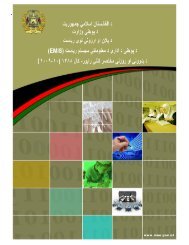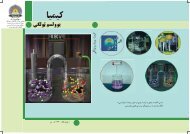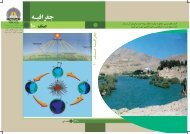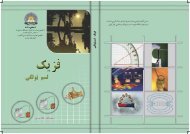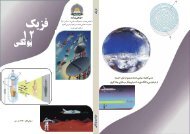Ministry of Education Directorate of EMIS
Ministry of Education Directorate of EMIS
Ministry of Education Directorate of EMIS
You also want an ePaper? Increase the reach of your titles
YUMPU automatically turns print PDFs into web optimized ePapers that Google loves.
<strong>Ministry</strong> <strong>of</strong> <strong>Education</strong> Summary Report <strong>of</strong> <strong>Education</strong> Situation ,Year 1388<br />
Executive Summary<br />
The following report highlights the challenges inherent in the Afghan educational system. These<br />
challenges are inherited from the past; however, the mismanagement <strong>of</strong> resources, corruption, and<br />
the existence <strong>of</strong> inefficient and time consuming bureaucratic procedures are some <strong>of</strong> the obstacles<br />
that need to be tackled. Consequently, the problems <strong>of</strong> access, quality and management are some <strong>of</strong><br />
the fundamental limitations. These challenges are significant in light <strong>of</strong> the current national<br />
socioeconomic and security situations. They envisage the presence <strong>of</strong> both visible and invisible<br />
impediments on the road to 2015. To overcome these challenges, there needs to be fundamental<br />
changes in the way the education system is run. Effective management system with monitoring and<br />
evaluation needs to be in place; redundant and inefficient bureaucratic procedures need to be<br />
trimmed significantly; regional and gender disparities need to be addressed; and serious efforts have<br />
to be made to address the issue <strong>of</strong> capacity building for teachers.<br />
It is also important to transform the mind set and worldview <strong>of</strong> individuals in the ministry to think<br />
about plans, solutions and proposed changes in a straightforward and simple way rather than<br />
produce complex narratives that only results in information overload. It appears there is this<br />
unfounded mentality to present reports, proposals and future plans in complex narratives simply to<br />
impress donors. However, many <strong>of</strong> these managers and planners forget that they are running an<br />
Afghan organization wherein Afghans need clear and concise instructions about their functions and<br />
responsibilities. Some <strong>of</strong> the shortcomings could be remedied while others are hostage to the archaic<br />
mindset, inherent flaws <strong>of</strong> the system <strong>of</strong> government and instability in the country as education is<br />
part <strong>of</strong> the larger scheme <strong>of</strong> national development.<br />
The <strong>Ministry</strong> <strong>of</strong> education and its partners employed a variety <strong>of</strong> methods for data collection. In<br />
2004, the <strong>Ministry</strong> <strong>of</strong> <strong>Education</strong> conducted its first school survey. The method used in this survey<br />
was confined to sending surveyors to visit schools throughout Afghanistan and collect records <strong>of</strong> the<br />
number <strong>of</strong> students enrolled in schools from their respective principals and school administrators. In<br />
2005, data collection forms were introduced and these forms were sent to schools to be filled in by<br />
the school headmasters. Since 2007, <strong>Ministry</strong> <strong>of</strong> <strong>Education</strong> has adopted a decentralized data<br />
<strong>Ministry</strong> <strong>of</strong> <strong>Education</strong><br />
1<br />
<strong>EMIS</strong> <strong>Directorate</strong>






